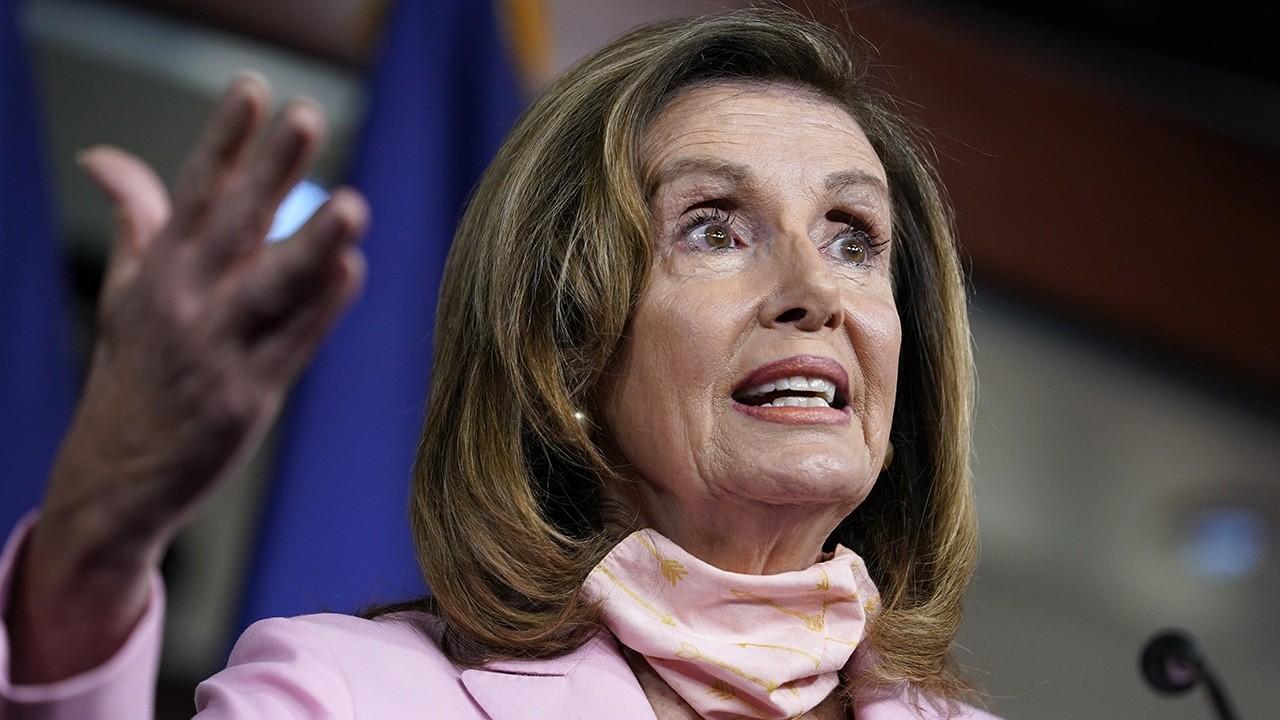Pelosi says virus relief talks will resume when GOP agrees to $2.2T price tag: 'We're not budging'
The top Democrat said the two sides remain at a 'tragic impasse'
An effort to resume coronavirus relief talks between White House officials and top Democrats stalled this week, with House Speaker Nancy Pelosi saying it's fruitless to revive the negotiations until the GOP agrees to a $2.2 trillion price tag.
Pelosi spoke with White House chief of staff Mark Meadows for 25 minutes on Thursday for the first time in close to a month, since the stimulus package efforts collapsed. But the California Democrat said the two sides remain at a "tragic impasse" over another round of emergency aid.
"We have said again and again that we are willing to come down, meet them in the middle — that would be $2.2 trillion," Pelosi told reporters. "When they're ready to do that, we'll be ready to discuss and negotiate. I did not get that impression on that call."
WASHINGTON IMPASSE ON CORONAVIRUS RELIEF THREATENS US ECONOMY
One of the biggest points of contention between the parties is the cost of the proposal. Democrats have offered to come down $1 trillion from the roughly $3 trillion HEROES Act, which the House passed in May. But the White House and Republican leaders want to keep the price tag closer to $1 trillion amid growing concerns over the nation's ballooning deficit.
“That could be a very short conversation if they’re not willing to meet in the middle,” Pelosi told reporters during her weekly press conference. “We’re not budging. They have to move."
Treasury Secretary Steven Mnuchin has called the $2 trillion figure a "non-starter," and has urged Democrats to return to the bargaining table and compromise on a $1 trillion package.
Senate Republicans are trying to finalize a smaller aid package, which is expected to include $300 in extra weekly federal unemployment benefits until Dec. 27, another round of money for the Paycheck Protection Program and an additional $10 billion for the U.S. Postal Service and liability protections. The proposal would also allocate additional funding for schools and education.
The revised measure, which is expected to cost somewhere around $500 billion, would represent a scaled-back version of the $1 trillion HEALS Act introduced by Republicans at the end of July. Senate Majority Leader Mitch McConnell has suggested that at least 20 Republican senators will not support the HEALS Act.
“I think we’re going to take another shot at it," Sen. Marco Rubio, R-Fla., said during an interview on "Fox & Friends" this week. "We're very close to having a bill that Republicans are prepared to move on, hopefully as early as next week."
SECOND STIMULUS CHECK MAY NOT GO OUT UNTIL SEPTEMBER AS RELIEF TALKS DRAG ON
Other Republicans have indicated that McConnell should force a vote on the pared-down measure.
If Republicans “can reach consensus on a package, I am for putting it on the floor and allowing senators to be senators," Sen. John Kennedy, R-La., told The Hill.
The Senate is slated to return from recess on Sept. 8 and the House on Sept. 14. Lawmakers will be given 24 hours notice if they need to return to the Capitol to vote on a deal.
The stalemate over the next rescue bill appears likely to drag on for weeks, possibly into late September, putting at risk potentially trillions of dollars in aid amid a pandemic that's infected more than 5 million and devastated the nation's economy.
After Congress allowed sweetened federal unemployment benefits and an eviction moratorium to lapse at the end of July, President Trump issued a series of executive actions on Aug. 8 that he said would address the economic fallout from the pandemic.
NEARLY HALF OF US JOBS LOST TO CORONAVIRUS COULD BE GONE PERMANENTLY, POLL FINDS
The measures would postpone the collection of payroll taxes for individuals earning less than $104,000 annually through the remainder of the year; partially restore supplemental unemployment benefits at $400 per week (25 percent of which would come from cash-strapped state budgets), extend student loan relief and discourage evictions.
Trump has vowed to forgive any taxes that are deferred, but without legislation, those payments will still be required by the delayed due date.
Some of his proposals are expected to face legal challenges. The Constitution gives Congress the power of federal spending, meaning that Trump does not have the legal authority to issue executive orders allocating how much money should be spent on the pandemic.




















